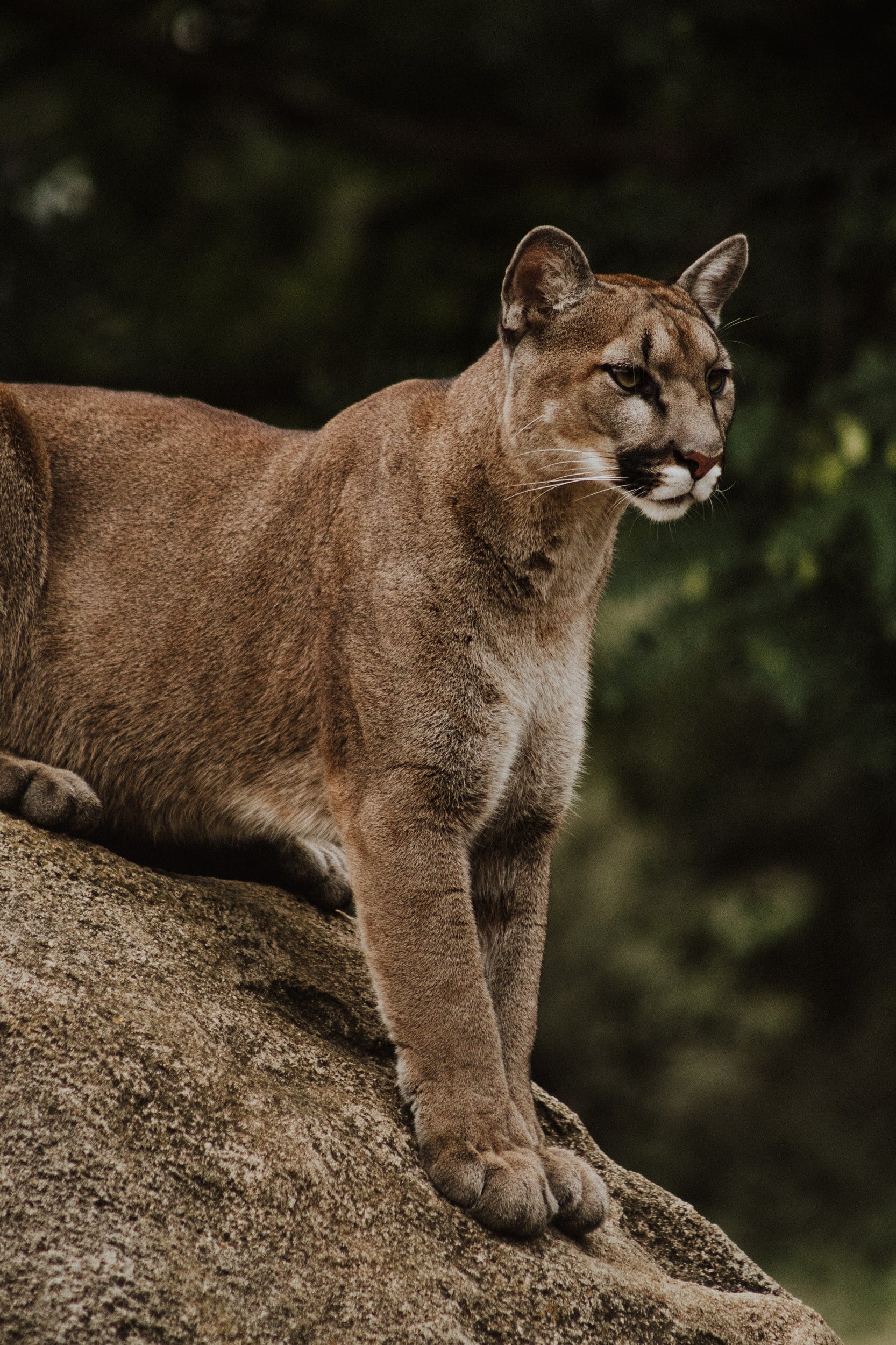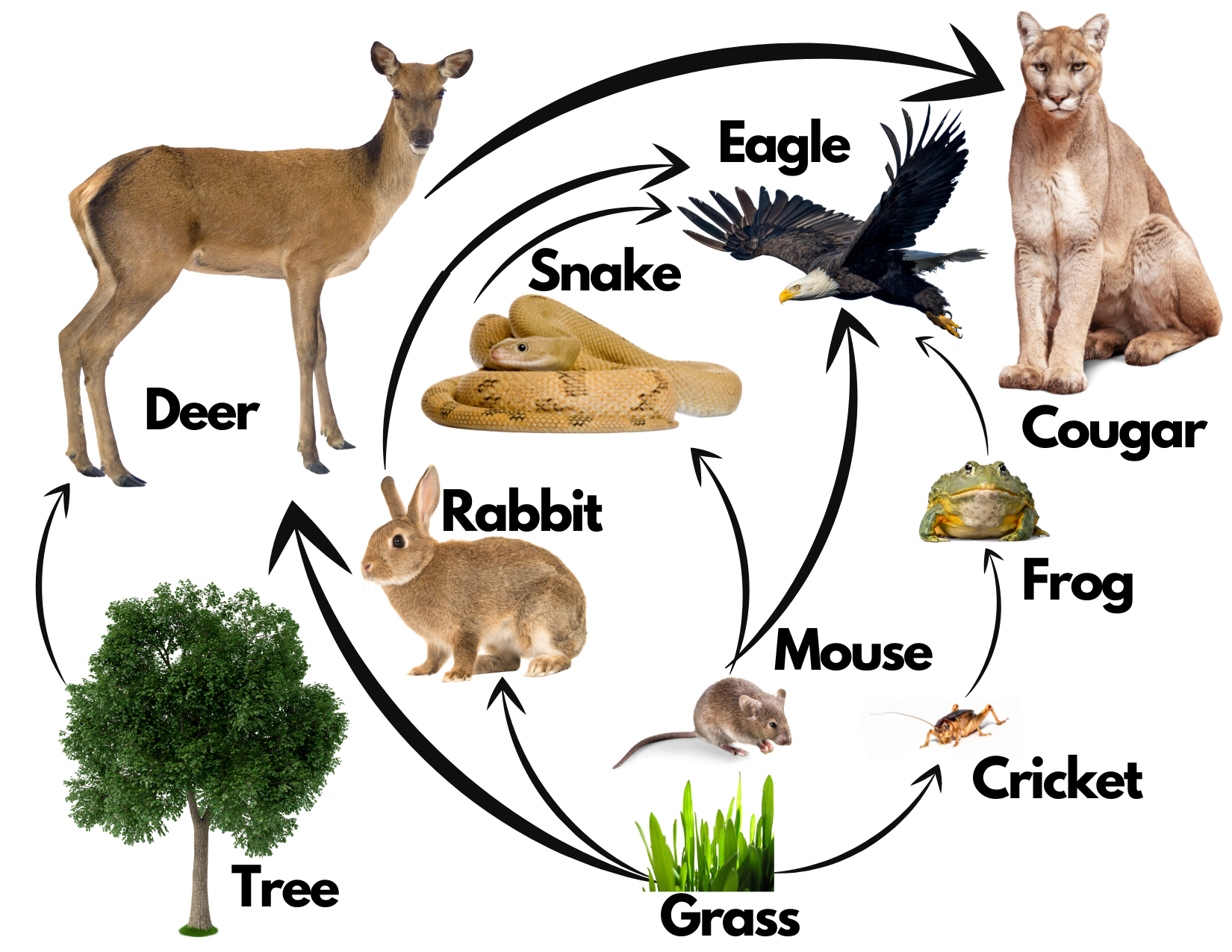
The Cougar Lesson
What sound do you think cougars make? Give your best cougar call!
While other large cats roar, cougars do not! Instead they make loud cries that are sometimes confused for screams (eek!) and purrrrrr. The cries they make are referred to as caterwauling by ecologists. " Oh, did you hear that? Sounds like the caterwaul of a cougar in that tree!"
GYE Food Chains
Have you heard of a food chain before? A food chain is how energy and nutrients go from one living thing to another in an ecosystem. For example, plants create energy that an herbivore, like a rabbit, might eat and then a carnivore, like a coyote, might eat the rabbit. Energy is transferred from one organism to another throughout this chain.
So where do cougars fall on the food chain?
Cougars are what we call an “apex predator”. This means they are on the top of the food chain with none of its own natural predators. While they may be at the top, they often yield to black bears, grizzly bears, and even gray wolves. When a cougar kills an animal, sometime bears and wolves will come to eat their kill. Cougars will leave their meal to these other predators to avoid conflict.
What are some other names for cougars?
Puma Concolor: This is the Latin name for the cougar and what scientists use
Why do you think some people call cougars Ghost Cats?
Cougars are reclusive by nature and like to avoid humans. You heard the sounds they make earlier, but they tend not to communicate too much. Mothers and their cubs sometimes mew to each other, but when they get older they communicate without sound. This can be through body language and marking with their scent. They keep to themselves, living and hunting solo and hunt in the darkness. Just like they avoid conflict with wolves and bears, they would prefer to avoid any human contact.
While they are elusive, cougars are also curious. This is why it’s important to stay aware when walking in cougar country, you might catch their curiosity.
Evolution
The Puma lineage includes cheetahs. Both cheetahs and cougars are considered “small cats”, though they are the largest in that category, and they both can purr.
How long do cougars live?
Baby cougars are called kittens or cubs. When they’re born, their eyes and ear canals are closed and they have brown spots on their fur that serve as camouflage. After a couple weeks, the kittens begin walking around as their eyes open and they drink as much milk from their nursing mother as possible.
The mother stays close when hunting and moves her kittens to one or more den sites around her territory. Before they are a year old, the mother takes them on hunting trips to teach them to survive on their own.
Young cougars typically stay with their mother for 12 to 18 months until their hunting skills are developed. Once they are ready, they disperse from the range they group up in and begin searching for their own.
When cougars are sexually mature, around 24 months, they begin to mate. Gestation lasts about 88 to 96 days and litters can be the size of one kitten to six.
Unfortunately, very few cougars live to their old age due to unnatural deaths. As humans build more houses and roads in cougar habitat, we affect their lives more and more.
More cougars die due to human-related elements than any other reason. Cougar hunting is legal in Arizona, Colorado, Texas, Utah, Washington, and Wyoming. While some states of banned hunting with dogs, Wyoming allows the use of hounds to hunt cougars. Using dogs to chase and tree cougars often results in orphaned kittens and disrupted migration patterns.

So where are they???

Cougars have a large range; from Canada to Patagonia! They can be found in many types of habits, from forests, mountains, deserts, and jungles.
They used to be found across the United States, however they are rarely found in eastern and central parts of the country. Since the 1900's, cougar populations have largely decreased due to bounty hunts, trophy hunting, poaching, kitten orphaning, habitat loss, and poisoning. While cougars are now mostly only found in 15 western states (and Florida) they have begun ranging back into eastern states in search of habitat.
Watch ‘The Secret Life of Mountain Lions’!
Have a minute? Check out The Secret Life of Mountain Lions, a 2016 film taken with motion-triggered cameras set by our partners Panthera’s Teton Cougar Project.
YOU can help cougars!
Stay up to date on local news about cougar survival in your area
Talk to your parents, siblings, friends, and neighbors about cougar survival
Reach out to policy makers about cougar related legislation and regulation
Keep learning!
Ready to test your knowledge? Take the Cougar Quiz!




